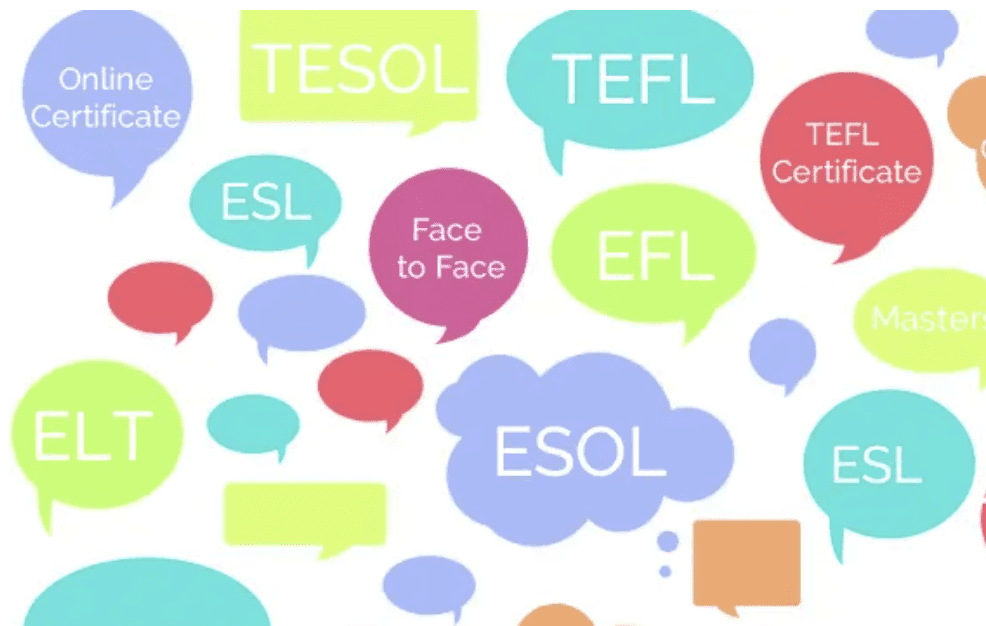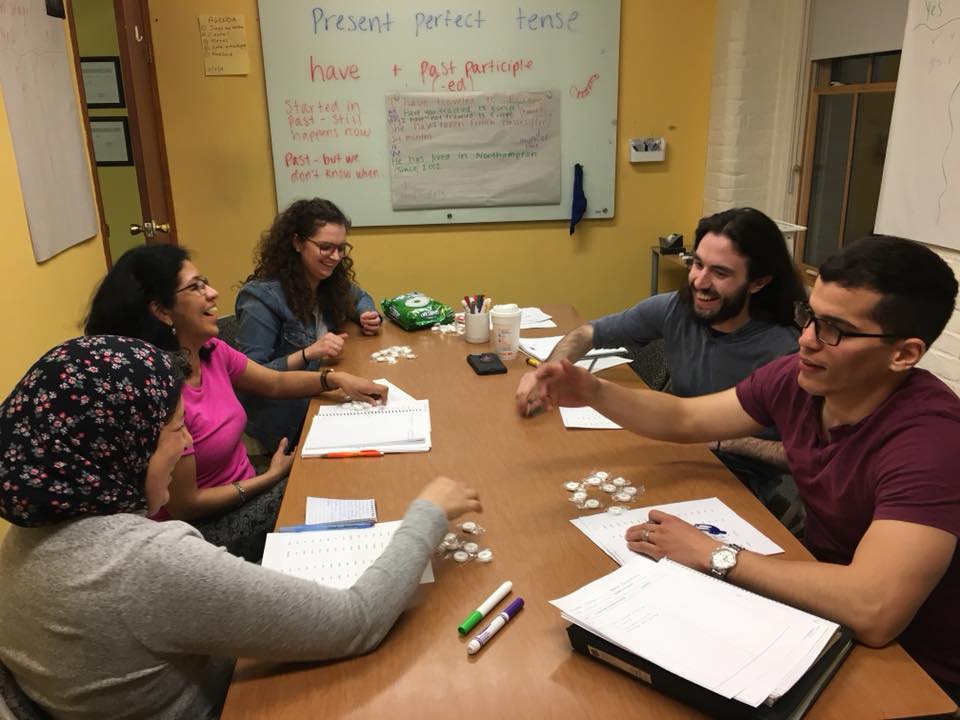What is TESOL: Definition
With a TESOL Certificate course, you are qualified to teach English language learners anywhere in the world. You learn the ins and outs of student-centered instruction.
TESOL stands for Teaching English to Speakers of Other Languages. It encompasses both TEFL and TESL. Accredited TESOL courses provide teacher training, making you a qualified candidate for ESOL teaching jobs at home in the USA or the rest of the world, from Argentina to Zambia.
Based in Northampton, Massachusetts, ILI is a leader in student-centered language instruction and teacher training. Accredited TESOL courses provide the practical tools, hands-on experience, and pedagogical principles.
SIT-certified TESOL trainers guide you through a comprehensive curriculum with the following modules: learning, teaching, speaking, pronunciation, structure, listening, reading, writing, and culture. You’ll practice wearing different “hats” of English acquisition for teachers and learners (more on that later.)
As a participant in a TESOL Certificate course, you experiment with and reflect on key teaching frameworks, core TESOL concepts, and multiple language acquisition tools. Completing the TESOL course means you’re ready to teach ESL/EFL students professionally.
Plus, you hone the classroom skills to make a human connection with your students.
Whether you’re based in the USA or abroad, the cost of a TESOL course earns you a passport to the world.
Do teacher training programs create better teachers?
Without a doubt, a TESOL Certificate course creates better, more confident teachers and happier students.
With an understanding of English for teachers, you can make an impact as an educator, a mentor, and an agent of change.
TESOL courses show you how to build a community where students participate, take risks, and use, speak, and write English in ways that are meaningful and relevant to their lives.
Many international students come to English classes with their heads full of textbook knowledge, grammar rules, and vocabulary detached from context.
Many students are too afraid of making mistakes to find their voice. Many have little experience actually speaking the language they so assiduously study in their rooms. Many do not come from educational backgrounds where they were encouraged to volunteer their opinions, engage their creativity, or seize control of their learning.
A TESOL Certificate course helps you become the kind of teacher who can unlock a student’s potential.
You can help them speak, write, and use the English they already have in their head–and then add to their knowledge, practical skills, and confidence.
Your students will not just understand but also actually put to use your lessons in ways that are relevant and important to their individual lives.
Accredited TESOL courses help you to not only talk the talk but also walk the walk of student-centered instruction. TESOL training makes your classroom dynamic and communicative. You’ll explore theories, techniques, and skills crucial to English for teachers. Plus, you do actual teaching practice with real ESL students.
Another way that our TESOL Certificate makes an impact is that it puts into practice the ideals of fairness and equity in education. TESOL teacher training will help you show how you really care about the learner.
You got into international education to make the world a better place through language instruction. A TESOL Certificate course is how to realize that ideal.
Another truism of teaching is to expect the unexpected. The real world challenges you face may not be the ones you predicted, and the obstacles you anticipated might fail to materialize.
That means you must be ready for anything. You may travel and teach in a distant corner of the globe. Or you may stay home and connect across international borders to teach online.
Either way, you must be nimble, adapting to students from multiple cultures, educational systems, and personal backgrounds. Your teaching career may take you to classrooms in Massachusetts, Moscow, Tokyo, Sydney, or Jakarta.
Class lengths, course requirements, and curricula will vary greatly, perhaps dramatically. Not to mention the extent to which local norms, students’ personalities, and varying English proficiencies impact every step of a lesson.
Your TESOL teacher training can be applied flexibly and widely to fit diverse organizations and student needs, whether you’re working with shy beginners for 45 minutes or a chatty mixed level group for two hours.
TESOL Certificate course gives you tools to adapt your lessons, content, and classroom management style. No matter the situation, you can use your TESOL training to build an effective student-centered environment.
Situations change, but the TESOL approach holds true.
Which is better: TESOL or TEFL?
TESOL, Teaching English to Speakers of Other Languages, encompasses both TEFL, Teaching English as a Foreign Language, and TESL, Teaching English as a Second Language.
A TESOL certificate is for teaching English in both non-native and native English  speaking countries. So, if you’d like to teach ESL students in the USA, the UK, Canada, Australia, and other primarily English-speaking countries, as well as EFL students in places like China, Colombia, and Saudi Arabia, then TESOL is your best bet.
speaking countries. So, if you’d like to teach ESL students in the USA, the UK, Canada, Australia, and other primarily English-speaking countries, as well as EFL students in places like China, Colombia, and Saudi Arabia, then TESOL is your best bet.
To sum up what to consider when choosing an English for teachers program:
- If you might teach both where English is the main language and where English is not the main language, you want an accredited TESOL Certificate course.
What sets a TESOL certificate apart is that it lets you teach ESOL anywhere in the world, from New England to Cairo.
The intensive TESOL Certificate program lasts four weeks and is accredited at 160 hours. These hours include workshops, lesson planning, teaching, feedback and reflective assignments.
The part-time TESOL is the same as the one-month, intensive 160-hour teacher-training course but meets one Saturday a month and on Monday and Wednesday evenings for three months.
How to obtain a TESOL Certificate
Based on a core philosophy of experiential learning and reflective teaching, the TESOL Certificate program provides the essential teaching tool kit for an effective ESOL instructor. Graduates receive an internationally recognized TESOL Certificate.
You have two options. The intensive TESOL teacher training program runs Monday through Friday from 10 am to 1 pm, with lunch from 1 to 2 pm, and afternoon class from 2 to 5 pm. Participants teach 6 hours during the program, with group planning sessions before every class taught and group processing sessions afterwards. There are no classes or meetings on the weekends.
The second option is the part-time evening TESOL Certificate program. This course is the same as the one-month, intensive 160-hour teacher-training course that provides participants with the practical skills and confidence they need to be successful in the ESOL classroom. This course meets one Saturday a month and on Monday and Wednesday evenings for three months.
For those three months, classes run on Saturdays from 10am – 5pm (lunch from 1 – 2pm) and every Monday and Wednesday evening from 4:30 – 9pm.
Currently offered online, the 2021 course dates for the part-time evening TESOL Certificate course are:
What to expect from a TESOL program
If you are a prospective or novice teacher, the course helps you enter the classroom with confidence, connect with students, and make an impact, even if you have never taught before.
If you are an experienced educator, you will explore a wide range of teaching and classroom management techniques to take your teaching to the next level.
As a participant in our TESOL teacher training, you put on many hats, which is key to becoming an effective educator.
First, when wearing your teacher’s hat you’re analyzing the TESOL teaching techniques and how they play out among different learners during an ESOL lesson.
Then when wearing your learner’s hat you experience the TESOL techniques from the point of view of the learners, each of whom brings different personal experiences and cultural expectations.
You don the other hats when observing your fellow participants, and when you are likewise observed by them.
First, you’ll examine the theory, and then you’ll put it into practice in your one-hour practice classes. You will have at least 6 opportunities to teach and be observed by your trainer and peer students. You’ll teach students whose first language is not English and see how you’re teaching helps non-native English speakers get to the next step as they improve their English. You’ll also see other teachers implementing the same practices for their own learners. All the while, you’ll reflect on your experiences while processing feedback from peers.
Juggling these multiple hats–the teacher, the learner, the teacher as learner, and learner as teacher–adds up to a powerful experience. You gain a 360-degree view of a student-centered academic environment.
 Even though the TESOL course is designed for participants with no teaching experience, seasoned ESOL classroom veterans experience profound changes with the training. The learner-centered approach is new for many folks, whether they’ve taught for decades or they’ve never taught at all.
Even though the TESOL course is designed for participants with no teaching experience, seasoned ESOL classroom veterans experience profound changes with the training. The learner-centered approach is new for many folks, whether they’ve taught for decades or they’ve never taught at all.
Through a process of reflection, you will critique your teaching, deepen your practice and principles, and implement positive changes in a supportive environment.
ILI’s trainers are certified by SIT (School for International Training), world leader in the TESOL field. Our trainers have worked together for many years and bring a wealth of practical teaching and cross-cultural experience to the TESOL course.
How much is a TESOL course?
TESOL teacher training is the most cost-effective way to become a qualified candidate for job markets in education around the globe. The cost of the TESOL Certificate course is $2,500, which includes a $300 non-refundable application fee.
Investing in TESOL Certificate training puts you in the running for a teaching position in any school and organization that provides ESOL instruction. Potential employers know you possess not only the theory and techniques of English for teachers but also hands-on experience and commitment to student success.
Potential employers know that your first day on the job at their organization won’t be your first time in front of students in a classroom.
Plus, it won’t be your first time designing a lesson with specific learning goals for a target audience, soliciting and processing feedback, and using your personal reflection to plan ahead for an even better lesson tomorrow.
Looking for financial aid for your TESOL Certificate cost? The TESOL Certificate Course is an approved training course for the following programs in Massachusetts:
- Individual Training Account (ITA): Career counselors at MassHire Career Centers can help you apply for an Individual Training Account (ITA), which provides financial support to job seekers who need occupational skills training in order to successfully re-enter the workforce. Eligible individuals choose from a pre-approved list of training courses, which include English teacher training courses and TESOL course distance learning, and tuition costs are paid directly out of the ITA. To find out if you are eligible for an ITA for your TESOL Certificate cost, please contact a MassHire Career Center.
- Section 30: Section 30, also known as the Training Opportunity Program, allows you to enroll in an approved training program such as TESOL courses while collecting unemployment insurance benefits, and may enable you to collect up to an additional 26 weeks of benefits. Section 30 does not provide funding for tuition for TESOL Certificate program, however.
- Financial aid for TESOL courses is available for Vermont residents through VSAC (Vermont Student Assistance Corporation).
- If SIT TESOL Certificate graduates later pursue a Master’s degree in teaching at the SIT Graduate Institute, a $2,000 discount will be applied to their tuition.
Related Articles
- ILI’s best practices for teaching online with Zoom
- How should I prepare for the TESOL certificate program?
- What to expect from an online TESOL course at ILI
- Are online TESOL certification courses valid?
- TESOL vs TEFL certificates: Which works best to teach English in the U.S.
- ILI Spotlight: Brian Long, teacher trainer and ILI instructor
- The Rejection of Perfection in Learning a Language
